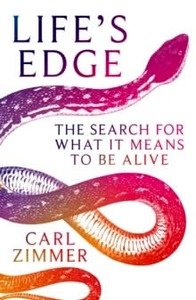Life's Edge
The Search for What it Means to be Alive

Editorial Pan
Fecha de edición marzo 2021 · Edición nº 1
Idioma inglés
EAN 9781529069426
368 páginas
Libro
encuadernado en tapa blanda
Dimensiones 153 mm x 234 mm
Resumen del libro
We all assume we know what life is, but the more scientists learn about the living world - from protocells to brains, from zygotes to pandemic viruses - the harder they find it is to locate the edges of life, where it begins and ends. What exactly does it mean to be alive? Is a virus alive? Is a foetus? Carl Zimmer investigates one of the biggest questions of all: What is life? The answer seems obvious until you try to seriously answer it. Is the apple sitting on your kitchen counter alive, or is only the apple tree it came from deserving of the word? If we can't answer that question here on earth, how will we know when and if we discover alien life on other worlds? The question hangs over some of society's most charged conflicts - whether a fertilized egg is a living person, for example, and when we ought to declare a person legally dead.
Life's Edge is an utterly fascinating investigation by one of the most celebrated science writers of our time. Zimmer journeys through the strange experiments that have attempted to recreate life. Literally hundreds of definitions of what that should look like now exist, but none has yet emerged as an obvious winner.
Lists of what living things have in common do not add up to a theory of life. It's never clear why some items on the list are essential and others not. Coronaviruses have altered the course of history, and yet many scientists maintain they are not alive.
Chemists are creating droplets that can swarm, sense their environment, and multiply. Have they made life in the lab?Whether he is handling pythons in Alabama or searching for hibernating bats in the Adirondacks, Zimmer revels in astounding examples of life at its most bizarre. He tries his own hand at evolving life in a test tube with unnerving results.
Charting the obsession with Dr Frankenstein's monster and how Coleridge came to believe the whole universe was alive, Zimmer leads us all the way into the labs and minds of researchers working on engineering life from the ground up.
Biografía del autor
Carl Zimmer, nacido en 1966, es uno de los divulgadores científicos más importantes de la actualidad. Empezó escribiendo sobre ciencia en la revista Discover, donde trabajó entre 1994 y 1998. Desde entonces ha escrito 13 libros sobre biología, medicina y neurociencia. De todos ellos, Parásitos: El extraño mundo de las criaturas más peligrosas de la naturaleza es el primero que se traduce al castellano. Publicado originalmente en el año 2000 con el título de Parasite Rex, según Los Ángeles Times, se trata de un libro capaz de transformar la forma en que vemos el mundo .







